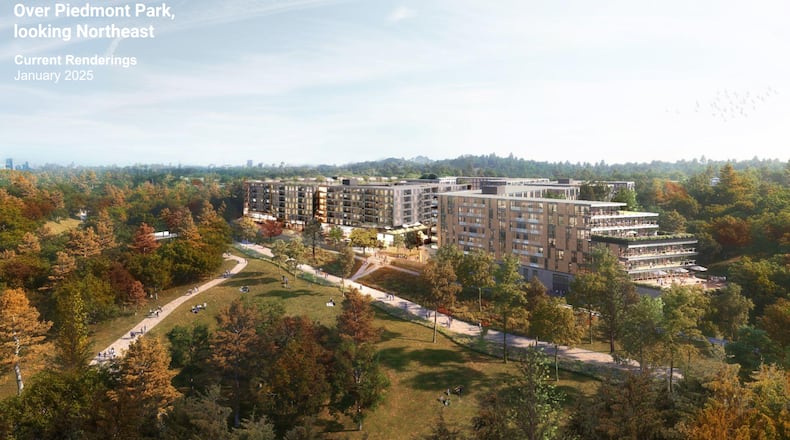The Atlanta City Council voted Monday to allow one of the largest projects along the Beltline and Piedmont Park to move forward, albeit by a razor-thin margin.
By an 8-6 vote, the council decided to rezone the Amsterdam Walk property near Monroe Drive to allow for more dense residential development as part of a project proposed by Atlanta-based developer Portman Holdings. The rezoning allows for up to 1,100 apartments to be included within the nearly 1.2 million-square-foot project.
Portman’s plan also features roughly 150,000 square feet of commercial and retail space alongside public plazas. Between 220 and 240 apartments will be reserved for affordable housing at rates below market rate, and roughly 19,000 square feet of ground-floor retail space will also be reserved at a 30% discount for tenants.
The redevelopment of Amsterdam Walk from an industrial retail center to a mid-rise mixed-use district sparked controversy that divided the area’s affluent neighborhoods. The proposal pitted a well-connected developer and affordable housing activists against a grassroots opposition group that criticized the project’s density, height and potential for worsening traffic.
“In the 12 years I’ve served on council, I’m not sure that I’ve seen this level of activism, discussion and advocacy,” said council member Alex Wan, whose district encompasses the 11-acre Amsterdam Walk property.
He was among the dissenting votes, but he said the council was ready to move the controversial rezoning forward and “let the votes fall where they may.”
Credit: Courtesy Portman Holdings, SOM Architects
Credit: Courtesy Portman Holdings, SOM Architects
Portman first proposed its revamp of Amsterdam Walk in 2023, intending to raze the aging warehouses to build a more dense and vertical project centered on apartments. The plan has undergone multiple tweaks over the past two years, including lowering the tallest building height from 17 stories to nine.
The property was zoned for dense commercial use, not residential, which is why Portman sought the rezoning to permit its apartment-dense plan. The prior zoning allowed for only 330 apartments but up to 750,000 square feet of commercial space, including office towers.
Project opponents within the Morningside-Lenox Park and Virginia Highland neighborhoods formed the grassroots group “A Better Amsterdam Walk.” In an email to The Atlanta Journal-Constitution, the group’s leaders said the prior zoning was “a scare tactic,” since developers haven’t shown interest in building a commercial project to that scale.
“To say that a massive commercial development is financially or even practically feasible at Amsterdam Walk is ludicrous,” they wrote. “Our community knows very well that this is a classic example of a fool’s choice.”
Credit: Zachary Hansen
Credit: Zachary Hansen
Neighborhood Planning Unit F, which includes both neighborhoods, voted 77% against endorsing the proposal last year. The project also received a recommendation to deny or no recommendation from other city boards intended to advise the council ahead of rezoning votes.
Several project opponents told the council during public comment that the council should respect the NPU vote and the opposition of the area’s council representative. Joining Wan in voting against the rezoning were Liliana Bakhtiari, Michael Julian Bond, Mary Norwood, Marci Collier Overstreet and Matt Westmoreland. Eshé Collins was absent.
Jennifer Borrero with activist group Abundant Housing Atlanta told the council during public comment that more housing is needed, especially in the city’s most affluent corners.
“It has been historically difficult to build in certain areas of the city. Virginia-Highland actually has less homes today in 2025 than it did in 2010,” she said, pointing out the neighborhood’s high average income. “I’m sure that is completely unrelated to why it is difficult to build low-income and mixed-income housing.”
Credit: NATRICE MILLER
Credit: NATRICE MILLER
Ben Terry, a resident opposed to the project, told the council during public comment that the neighborhoods have clearly repeated they don’t want Portman’s project as presented. He said the developer’s motives are focused on profit, not melding with nearby neighborhoods.
“People in business will always choose more money if it’s an option,” he said. “If you have the fortitude to take that highest dollar option off the table, they will adapt and they will come back with something better.”
Ryan Sanders, a Morningside-Lenox Park resident in favor of the project, argued that neighborhoods evolve with time.
“Neighborhoods are not static. If we don’t invest in our neighborhoods, they decline and depreciate,” he said. “... Investment is key to keeping our neighborhood alive and healthy.”
About the Author
Keep Reading
The Latest
Featured





